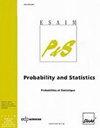正则惯性Dean-Kawasaki方程:低密度状态的不连续伽辽金近似和建模
IF 0.7
4区 数学
Q4 STATISTICS & PROBABILITY
引用次数: 1
摘要
正则化惯性迪恩-川崎模型(RIDK)——由作者和J. Zimmer在早期的作品中介绍——是一个非线性随机偏微分方程,在粒子密度和动量密度上捕获大规模粒子系统的平均场极限附近的波动。我们重点关注以下两个方面。首先,建立了RIDK模型的不连续Galerkin (DG)离散化方案,给出了符合RIDK模型波动性质的网格单元界面处数值通量的适当定义,并赋予了模拟的稳定性,并量化了连续RIDK模型的均方收敛速度。其次,我们引入了对RIDK模型的修改,以保持密度的正性(这种特征仅在原始RIDK模型的“高概率意义”下成立)。通过数值模拟,我们表明,修改导致物理上真实的和正的密度分布。在一种情况下,受制于额外的正则性约束,我们也证明了正性。最后,我们介绍了我们的方法在扩散和反应粒子系统中的应用。我们的Python代码以开源格式提供。本文章由计算机程序翻译,如有差异,请以英文原文为准。
The Regularised Inertial Dean-Kawasaki equation: discontinuous Galerkin approximation and modelling for low-density regime
The Regularised Inertial Dean–Kawasaki model (RIDK) – introduced by the authors and J. Zimmer in earlier works – is a nonlinear stochastic PDE capturing fluctuations around the meanfield limit for large-scale particle systems in both particle density and momentum density. We focus on the following two aspects. Firstly, we set up a Discontinuous Galerkin (DG) discretisation scheme for the RIDK model: we provide suitable definitions of numerical fluxes at the interface of the mesh elements which are consistent with the wave-type nature of the RIDK model and grant stability of the simulations, and we quantify the rate of convergence in mean square to the continuous RIDK model. Secondly, we introduce modifications of the RIDK model in order to preserve positivity of the density (such a feature only holds in a “high-probability sense” for the original RIDK model). By means of numerical simulations, we show that the modifications lead to physically realistic and positive density profiles. In one case, subject to additional regularity constraints, we also prove positivity. Finally, we present an application of our methodology to a system of diffusing and reacting particles. Our Python code is available in open-source format.
求助全文
通过发布文献求助,成功后即可免费获取论文全文。
去求助
来源期刊

Esaim-Probability and Statistics
STATISTICS & PROBABILITY-
CiteScore
1.00
自引率
0.00%
发文量
14
审稿时长
>12 weeks
期刊介绍:
The journal publishes original research and survey papers in the area of Probability and Statistics. It covers theoretical and practical aspects, in any field of these domains.
Of particular interest are methodological developments with application in other scientific areas, for example Biology and Genetics, Information Theory, Finance, Bioinformatics, Random structures and Random graphs, Econometrics, Physics.
Long papers are very welcome.
Indeed, we intend to develop the journal in the direction of applications and to open it to various fields where random mathematical modelling is important. In particular we will call (survey) papers in these areas, in order to make the random community aware of important problems of both theoretical and practical interest. We all know that many recent fascinating developments in Probability and Statistics are coming from "the outside" and we think that ESAIM: P&S should be a good entry point for such exchanges. Of course this does not mean that the journal will be only devoted to practical aspects.
 求助内容:
求助内容: 应助结果提醒方式:
应助结果提醒方式:


